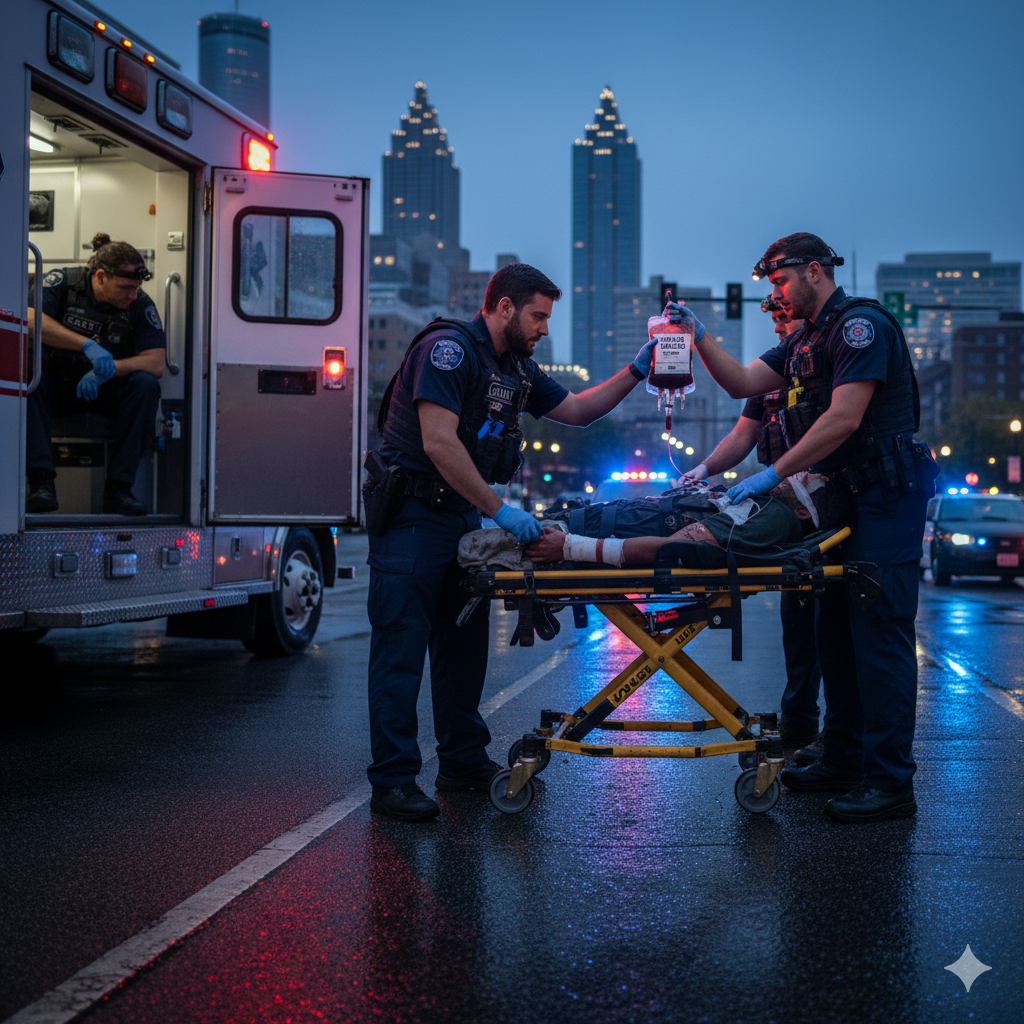
Grady EMS Atlanta Prehospital Whole Blood Program: A Summary
Share
Grady EMS in Atlanta has implemented a pioneering prehospital whole blood transfusion program, marking a significant advancement in emergency medical care within a metropolitan setting. This initiative allows paramedics to administer whole blood to critically injured patients before they reach the hospital, a practice that has shown promising early results in improving patient outcomes [1].
Key Findings and Benefits in Metropolitan Areas
Improved Patient Stability and Survival: Early reports from Grady EMS indicate that patients receiving prehospital whole blood transfusions arrive at the emergency room in a more stable condition. For instance, four critically injured patients (three with gunshot wounds and one from a car crash) who were bleeding profusely received whole blood transfusions in Grady ambulances and subsequently arrived at the hospital more stable, with the transfusions likely saving their lives [1]. This aligns with broader research indicating that whole blood transfusions can significantly improve survival rates. A 2022 study in the Journal of the American College of Surgeons found that whole blood transfusions improved 30-day survival by 60% in patients experiencing hemorrhagic shock, compared to transfusions using other blood components [1].
Addressing Preventable Trauma Deaths: Uncontrolled bleeding is identified as the leading cause of preventable death from trauma, accounting for 35% of trauma-related fatalities before a patient reaches a hospital [1]. The ability to initiate blood transfusions in the field directly addresses this critical window, as a person with uncontrolled bleeding can die in as little as five minutes [1]. By bringing this life-saving intervention outside the hospital, Grady EMS aims to advance care earlier, effectively starting healthcare when a 911 call is made rather than solely upon hospital arrival [1].
Feasibility and Effectiveness in a Large Metropolitan System: The implementation of Grady's prehospital whole blood program demonstrates its feasibility and effectiveness in a busy metropolitan area with a large catchment zone. Preliminary results over 15 months showed safe and effective delivery of prehospital whole blood (PH-WB), minimal variation in prehospital scene times, a 0% expiration rate of low-titer O-positive whole blood (LTOWB) in the field, and high compliance with protocols [2]. This suggests that with creative strategies and proper resource management, such programs can be successfully integrated into complex urban emergency medical services.
Target Patient Population: The program targets patients experiencing hemorrhagic shock, characterized by dangerously low blood pressure and a rapidly increasing heart rate due due to significant blood loss. These are the individuals most likely to benefit from immediate blood product administration [1]. Grady, as Atlanta's only Level 1 trauma center, estimates these transfusions could assist up to 300 trauma patients annually [1].
Parallels to Battlefield Medicine: The scientific basis for prehospital whole blood transfusions has strong roots in military conflicts, where whole blood therapy demonstrated significant benefits for trauma victims. Dr. Ryan Fransman, a trauma surgeon at Grady, notes the parallels between combat injuries and the severe trauma cases seen in Atlanta, emphasizing the importance of applying battlefield medicine principles to urban settings [1].
Conclusion
The Grady EMS prehospital whole blood program represents a crucial step forward in trauma care for metropolitan areas. By providing immediate access to whole blood transfusions, the program aims to stabilize critically injured patients earlier, reduce preventable deaths from hemorrhage, and ultimately improve survival rates. The successful implementation in Atlanta serves as a model for other urban EMS systems considering similar life-saving initiatives.
References
[1] Oliviero, H. (2024, March 25). 'This will save lives': Atlanta medics begin whole blood transfusions. EMS1. https://www.ems1.com/whole-blood/this-will-save-lives-atlanta-medics-begin-whole-blood-transfusions
[2] Fransman, R.B. (2025). If you build it, they will come - Implementation of a prehospital whole blood program. The American Journal of Surgery. https://www.sciencedirect.com/science/article/abs/pii/S0002961025004106